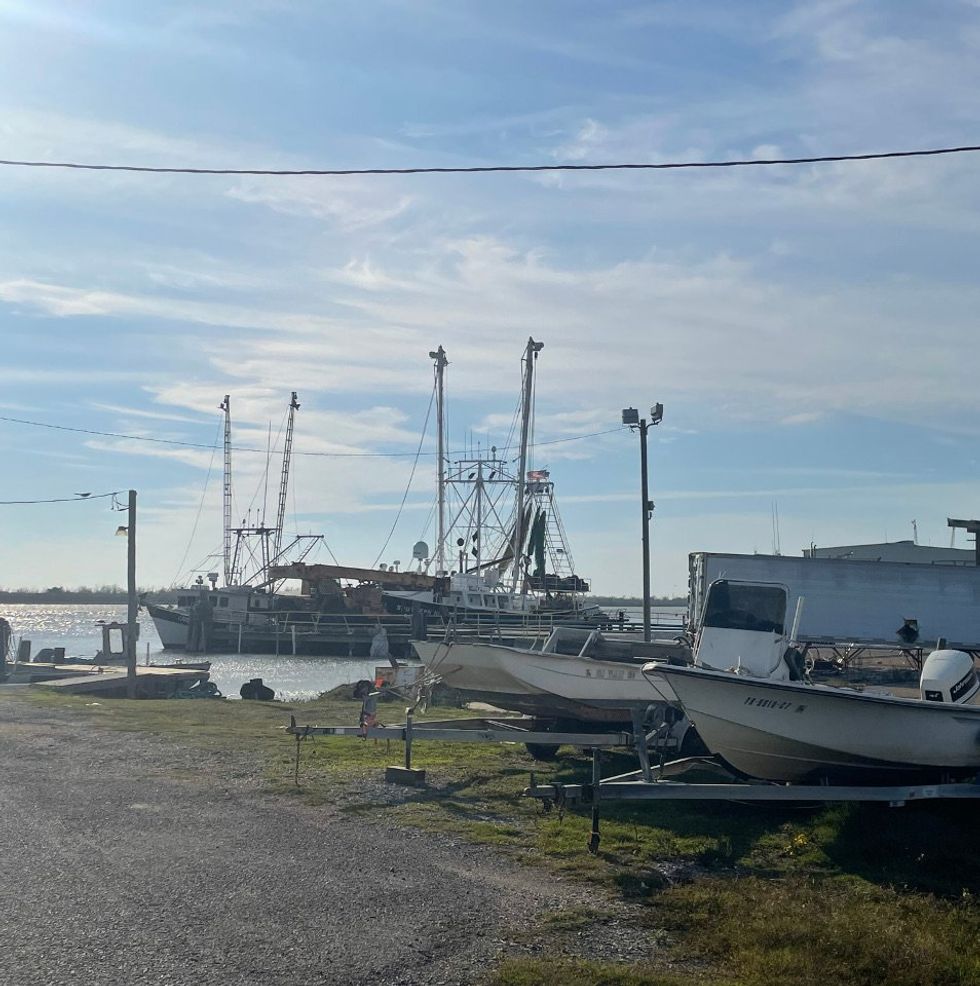
www.tampabay.com
06 July 2020
Trump’s climate change record under the microscope in new ad targeting Tampa voters
The 30-second spot is part of a $1.7 million effort to highlight Trump's environmental record.

The 30-second spot is part of a $1.7 million effort to highlight Trump's environmental record.

“Putting resources toward carbon capture and storage instead of renewable energy is wasting time we don’t have.”
PITTSBURGH — A group of more than 30 environmental and health advocacy groups have asked Pennsylvania Governor Josh Shapiro to veto a bill that would pave the way for carbon storage in the state.
The bill, SB831, which was passed by the state legislature on Friday, creates a legal framework for climate-warming carbon emissions captured from burning fossil fuels to be injected underground and stored indefinitely to prevent them from escaping into the atmosphere. Some environmental advocacy groups support the bill, while others oppose it.
Carbon capture and storage infrastructure is being advanced across the country thanks to federal funding and tax credits through the federal Inflation Reduction Act, but the technology remains controversial.
Proponents say it can reduce carbon emissions while protecting the power grid, while opponents say the technology is unproven and will divert resources from the rapid clean energy transition needed to slow climate change. The debate over the Pennsylvania bill has mirrored the national and global debates about carbon capture and storage.
“Inviting this technology into the state is just setting us up for more fossil fuel extraction, which is what it’s actually all about,” Karen Feridun, co-founder of the Better Path Coalition, a Pennsylvania-based environmental advocacy group, told EHN. “Putting resources toward carbon capture and storage instead of renewable energy is wasting time we don’t have.”
On July 16, the Better Path Coalition submitted a letter on behalf of more than 30 environmental advocacy groups calling on Governor Shapiro to veto the bill.
“Inviting this technology into the state is just setting us up for more fossil fuel extraction, which is what it’s actually all about." - Karen Feridun, Better Path Coalition
“The bill strips Pennsylvania landowners of their subsurface property rights, shifts liability to the state, and exposes everyone to a new and very dangerous generation of fossil fuel Infrastructure,” the letter reads. “SB 831 should not be enacted for the sake of the Commonwealth and the people who depend on you to make the courageous choice to protect them.”
The letter also references a previous letter the group sent to lawmakers prior to the vote on the bill that outlined scientific concerns about the shortcomings of carbon capture and storage technology.
“There are a lot of unanswered questions about how to do carbon storage safely and effectively in general, and even more about doing it in Pennsylvania where we have unique geology and hundreds of thousands of abandoned [oil and gas] wells, many of which are in unknown locations,” Feridun said. “It’s premature at best to pass a bill allowing this and saying it’s in the public interest when this process has never been done successfully.”
Several lawmakers, including state Senator Katie Muth and state Representative Greg Vitali, made remarks opposing the bill prior to its passage.
“This bill is deeply flawed and does not provide the necessary safeguards for communities or our environment nor does it provide an actual solution for combatting the climate crisis,” Muth said.
The bill received support from business and labor organizations including the Pennsylvania State Building and Construction Trades Council, the AFL-CIO, and the Pennsylvania Chamber of Business and Industry.
“Carbon capture technology has the potential to create a significant number of good paying jobs in the construction industry while simultaneously creating family-sustaining permanent jobs for the citizens of our commonwealth,” said Robert Bair, president of the Pennsylvania State Building and Construction Trades Council, in a statement.
A handful of other environmental advocacy groups, including the Pennsylvania Environmental Council, Environmental Defense Fund, the Clean Air Task Force, and the Nature Conservancy, worked with lawmakers in the House to amend the bill and ultimately supported its passage.
“Carbon capture technology has the potential to create a significant number of good paying jobs in the construction industry while simultaneously creating family-sustaining permanent jobs for the citizens of our commonwealth.” - Robert Bair, Pennsylvania State Building and Construction Trades Council
The amendments included public land protections, special provisions for environmental justice communities, community engagement requirements, improved landowner rights, preventative requirements for induced seismic activity, extending the default post-injection site care period, and enabling the Department of Environmental Protection to promulgate and enforce additional regulations as needed to protect the people and environment of the Commonwealth.
“The future of [carbon capture and storage] in Pennsylvania remains to be seen, but we cannot forgo the opportunity to adopt necessary performance standards,” the Pennsylvania Environmental Commission said in a statement. “Now we have the basis to make that happen.”
Feridun said of the amendments, “They’re like putting on cologne when you have really bad body odor… the bill is still fundamentally a bad bill.”
Carbon capture and storage are necessary to pave the way for Pennsylvania to be part of two proposed, federally funded hydrogen hubs — the Mid-Atlantic Hydrogen Hub and the Appalachian Hydrogen Hub — which would rely on the technology. Both projects have the potential to funnel billions of taxpayer dollars to industry partners, which include numerous fossil fuel companies.

CAMERON PARISH, La. — Late into the night, John Allaire watches the facility next to his home shoot 300-foot flares from stacks.
He lives within eyesight of southwest Louisiana’s salty shores, where, for decades, he’s witnessed nearly 200 feet of land between it and his property line disappear into the sea. Two-thirds of the land was rebuilt to aid the oil and gas industry’s LNG expansion. LNG — shorthand for liquified natural gas – is natural gas that's cooled to liquid form for easier storage or transport; it equates to 1/600th the volume of natural gas in a gaseous state. It’s used to generate electricity, or fuel stove tops and home heaters, and in industrial processes like manufacturing fertilizer.
In the U.S., at least 30 new LNG terminal facilities have been constructed or proposed since 2016, according to the Oil and Gas Watch project. Louisiana and Texas’ Gulf Coast, where five facilities are already operating, will host roughly two-thirds of the new LNG terminals – meaning at least 22 Gulf Coast LNG facilities are currently under construction, were recently approved to break ground or are under further regulatory review.
Although the U.S. didn’t ship LNG until 2016, when a freight tanker left, a few miles from where Cameron Parish’s LNG plants are today, last year the country became the global leader in LNG production and export volume, leapfrogging exporters like Qatar and Australia. The EIA’s most recent annual outlook estimated that between the current year and 2050, U.S. LNG exports will increase by 152%.
And it’s changed local economic estimates: last year, retired Louisiana State University professor Loren Scott’s economic forecast last year predicted an additional $36 billion in oil and gas industry spending will boost local employment by 7% over just two years.
Allaire, 68, watches how saltwater collects where rainwater once fed the area’s diminishing coastal wetlands. “We still come down here with the kids and set out the fishing rods. It's not as nice as it used to be,” he told Environmental Health News (EHN).
That intimacy with nature drew Allaire to the area when he purchased 311 acres in 1998. An environmental engineer and 30-year oil and gas industry veteran, he helped lead environmental assessments and manage clean-ups, and although retired, he still works part-time as an environmental consultant with major petroleum companies. With a lifetime of oil and gas industry expertise, he’s watched the industry's footprint spread across Louisiana and the Gulf of Mexico’s fragile shores and beyond. Now that the footprints are at the edge of his backyard, Allaire is among a cohort of organizers, residents and fisher-folk in the region mobilizing to stop LNG facility construction. For him, the industry’s expansion usurps the right-or-wrong ethics he carried across his consulting career. For anglers, oil and gas infrastructure has destroyed fishing grounds and prevented smaller vessels from accessing the seafood-rich waters of the Calcasieu River.
From the view of Allaire’s white pickup truck as he drives across his property to the ocean’s shore, he points to where a new LNG facility will replace marshlands. Commonwealth LNG intends to clear the land of trees and then backfill the remaining low-lying field.
“You see what’s happening with the environment,” Allaire said. “When the facts change, I got to change my mind about what we’re doing.”

John Allaire, left, purchased 311 acres in Cameron Parish in 1998, and has watched the oil and gas industry's footprint spread to his property.
Credit: John Allaire
During an Earth Day rally in April, community members gathered in the urban center of Lake Charles to demand local oil and gas industries help deliver a safer, healthier future for all. In between live acts by artists performing south Louisiana’s quintessential zydeco musical style, speakers like James Hiatt, a Calcasieu Parish native with ties to Cameron Parish and a Healthy Gulf organizer, and RISE St. James organizer Sharon Lavigne, who’s fighting against LNG development in rural Plaquemines Parish near the city of New Orleans, asked the nearly 100 in attendance to imagine a day in which the skyline isn’t dotted by oil and gas infrastructure.
Not long ago, it was hard to imagine an Earth Day rally in southwest Louisiana at all. For decades, the area has been decorated with fossil fuel infrastructure. Sunsets on some days are highlighted by the chemicals in the air; at night, thousands of facilities’ lights dot the dark sky.
“It takes a lot of balls for people to start speaking up,” Shreyas Vasudevan, a campaign researcher with the Louisiana Bucket Brigade, told EHN in the days after the rally. In a region with its history and economy intertwined with oil and gas production, “you can get a lot of social criticism – or ostracization, as well – even threats to your life.”
Many are involved in local, regional and national advocacy groups, including the Louisiana Bucket Brigade, Healthy Gulf, the Sierra Club, the Natural Resources Defense Council, the Turtle Island Restoration Network, the Center for Biological Diversity and the National Audubon Society.
But environmental organizers are fighting a multi-billion-dollar industry with federal and state winds at its back. And LNG’s federal support is coupled with existing state initiatives.
Under outgoing Louisiana Gov. John Bel Edwards — a term-limited Democrat — the state pledged a goal of reaching net-zero greenhouse emissions by 2050. Natural gas, which the LNG industry markets as a cleaner-burning alternative, is cited as one of the state’s solutions. Louisiana is the only state that produces a majority of its carbon emissions through fossil fuels refining industries, like LNG, rather than energy production or transportation. Governor Edwards’ office did not return EHN’s request for comment.
This accommodating attitude towards oil and gas industries has resulted in a workforce that’s trained to work in LNG refining facilities across much of the rural Gulf region, said Steven Miles, a lawyer at Baker Botts LLP and a fellow at the Baker Institute’s Center on Energy Studies. Simultaneously, anti-industrialization pushback is lacking. It’s good news for industries like LNG.
“The bad news,” Miles added. “[LNG facilities] are all being jammed in the same areas.”
One rallying cry for opponents is local health. The Environmental Integrity Project found that LNG export terminals emit chemicals like carbon monoxide –potentially deadly– and sulfur dioxide, of which the American Lung Association says long-term exposure can lead to heart disease, cancer, and damage to internal or female reproductive organs.
An analysis of emissions monitoring reports by the advocacy group the Louisiana Bucket Brigade found that Venture Global’s existing Calcasieu Pass facility had more than 2,000 permit violations.That includes exceeding the permit’s authorized air emissions limit to release nitrogen oxides, carbon monoxide, particulate matter and volatile organic compounds 286 out of its first 343 days of operation.

The Marvel Crane, the first liquid natural gas carrier to transport natural gas from the Southwest Louisiana LNG facility, transits a channel in Hackberry, Louisiana, May 28, 2019.
Credit: Coast Guard News
Rather than amend its infrastructure to meet regulatory standards, Venture Global is asking the state to raise its facility’s air emissions permit limits to release an additional 833% of greenhouses gasses each year, according to the Louisiana Bucket Brigade’s January report. If approved, permitted emissions would rise to roughly 4.65 million tons, making the facility the state’s fifth-largest emitter), according to a 2021 statewide greenhouse data inventory compiled by Louisiana State University’s Center for Energy Studies.
“This is just one facility,” at a time when three more facilities have been proposed in the region and state, Vasudevan said. Venture Global’s operational LNG facility — also known as Calcasieu Pass — “is much smaller than the other facility they’ve proposed.”
In an area that experienced 18 feet of storm surge during Hurricane Laura in 2020 — and just weeks later, struck by Hurricane Delta — Venture Global is planning to build a second export terminal Known as “CP2,” it’s the largest of the roughly two dozen proposed Gulf LNG export terminals, and a key focal point for the region’s local organizing effort.
Residents “don’t really want LNG as much as they want Cameron [Parish] from 1990 back,” Hiatt told EHN of locals’ nostalgia for a community before storms like Rita in 2005 brought up to 15 feet of storm surge, only for Laura to repeat the damage in 2020. Throughout that time, the parish’s population dipped from roughly 10,000 to 5,000. “But the wolf knocking at the door is LNG. Folks in Cameron think that's going to bring back community, bring back the schools, bring back this time before we had all these storms — when Cameron was pretty prosperous.”
“Clearly,” for the oil and gas industry, “the idea is to transform what was once the center of commercial fishing in Louisiana to gas exports,” Cindy Robertson, an environmental activist in southwest Louisiana, told EHN.
Helping fishers’ impacted by LNG is about “actual survival of this unique culture,” Cooke said.
In a measure of organizers’ success, she pointed to a recent permit hearing for Venture Global’s CP2 proposal. Regionally, it’s the only project that’s received an environmental permit, but not its export permit, which remains under federal review. At the meeting, some spoke on the company’s behalf. As an organizer, it was a moment of clarity, Cooke explained. Venture Global officials “had obviously done a lot of coaching and organizing and getting people together in Cameron to speak out on their behalf,” Cooke said. “So, in a way, that was bad. But in another way, it shows that we really had an impact.”
“It also shows that we have a lot to do,” Cooke added.
Environmental organizers like Alyssa Portaro describe a sense of fortitude among activists — she and her husband to the region’s nearby town of Vinton near the Texas-Louisiana border. Since the families’ relocation to their farm, Portaro has worked with Cameron Parish fisher-folk.
“I’ve not witnessed ‘community’ anywhere like there is in Louisiana,” Portaro told EHN. But a New Jersey native, she understands the toll environmental pollution has on low-income communities. “This environment, it’s so at risk — and it’s currently getting sacrificed to big industries.”
“People don’t know what we’d do without oil and gas. It comes at a big price,” she added.

Southwest Louisiana’s Cameron Parish is one of the state’s most rural localities. Marine economies were the area’s economic drivers until natural disasters and LNG facilities began pushing locals out, commercial fishers claim.
Credit: Xander Peters for Environmental Health News

Residents “don’t really want LNG as much as they want Cameron [Parish] from 1990 back,” James Hiatt , a Healthy Gulf organizer, told EHN. "But the wolf knocking at the door is LNG."
Credit: Xander Peters for Environmental Health News

For the most part, Cameron Parish’s life and economy has historically taken place at sea. As new LNG facilities are operational or in planning locally, locals claim the community they once knew is nearly unrecognizable.
Credit: Xander Peters for Environmental Health News
The stakes are seemingly higher for a region like southwest Louisiana, which is the epicenter of climate change impacts.
In nearly a century, the state has lost roughly 2,000 square miles of land to coastal erosion. In part driving the state’s erosion crisis is the compounding impacts of Mississippi River infrastructure and oil and gas industry activity, such as dredging canals for shipping purposes, according to a March study published in the journal Nature Sustainability. Louisiana’s Coastal Protection and Restoration Authority said Cameron Parish could lose more land than other coastal parishes over the next 50 years. A recent Climate Central report says the parish will be underwater within that time frame.
On top of erosion and sea level rise impacts, in August, 2023, marshland across southwest Louisiana’s Cameron Parish burned. The fires were among at least 600 across the Bayou State this year. Statewide, roughly 60,000 acres burned — a more than six-fold increase of the state’s average acres burned per year in the past decade alone.
But while the blaze avoided coastal Louisiana communities like Cameron Parish, the fires represented a warning coming from a growing chorus of locals across the region — one that’s echoes by the local commercial fishing population, who claimed to have experienced unusually low yields during the same time, according to a statement from a local environmental group. At the site of the Cameron Parish fires are locations for two proposed LNG expansion projects.
It was an unusual occurrence for an area that’s more often itself underwater this time of year due to a storm surge from powerful storms. For LNG expansion’s local opposition, it was a red flag.
As the Louisiana Bucket Brigade has noted prior, the confluence of climate change’s raising of sea levels and the construction of LNG export terminals — some are proposed at the size of nearly 700 football fields — are wiping away the marshland folks like Allaire watched wither. Among their fears is that the future facilities won’t be able to withstand the power of another storm like Laura and its storm surge, which wiped away entire communities in 2020.
Amidst these regional climate impacts, LNG infrastructure has shown potential to exacerbate the accumulation of greenhouse gasses that cause global warming. For the most part, LNG is made up of methane — a greenhouse gas that’s more than 80 times more potent than carbon dioxide in the atmosphere. Among the 22 current LNG facility proposals, the advocacy group Sierra Club described a combined climate pollution output that would roughly equal to that of about 440 coal plants.
The climate impacts prompt some of the LNG industry’s uncertainty going forward. It isn’t clear if Asian countries, key importers of U.S. LNG, will “embrace these energy transition issues,” said David Dismuke, an energy consultant and the former executive director of Louisiana State University’s Center for Energy Studies. Likewise, European nations remain skeptical of embracing LNG as a future staple fuel source.
“They really don't want to have to pull the trigger,” Dismukes added, referring to Europe’s hesitation to commit more resources to exporting LNG from the American market. “They don't want to go down that road.”
While there will be a tapering down of natural gas supply, Miles explained, “we’re going to need natural gas for a long time,” as larger battery storage for renewables is still unavailable.
“I'm not one of these futurists that can tell you where we're going to be, but I just don't see everything being extreme,” Dismukes said. “I don't see what we've already built getting stranded and going away, either.”
For now, LNG seems here to stay. From 2012 to 2022,U.S. natural gas demand — the sum of both domestic consumption and gross exports — rose by a whopping 43%, reported the U.S. Energy Information Administration, or EIA. Meanwhile, in oil and gas hotbeds like Louisiana and Texas, natural gas demand grew by 116%.
Throughout 25 years, Allaire has witnessed southwest Louisiana’s land slowly fade, in part driven by the same industrial spread regionally. Near where the front door of his travel trailer sits underneath the aluminum awning, he points to a chenier ridge located near the end of the property. It’s disappearing, he said.
“See the sand washing over, in here?” Allaire says, as he points towards the stretches of his property. “This pond used to go down for a half mile. This is all that's left of it on this side.”
Read Part 1: LNG production comes with a price, Gulf Coast communities warn
Some funding for this reporting was also provided by the Wake Forest University Environmental and Epistemic Justice Initiative.

Despite record-breaking heat and public concern over climate change, the Republican National Convention focuses on expanding fossil fuel use, dismissing climate science.
In short:
Key quote:
“Global warming is fine. In fact, I heard it was going to be very warm today. It’s fine.”
— Former President Donald J. Trump
Why this matters:
Ignoring climate change can worsen environmental and public health crises. The push for fossil fuels contradicts global efforts to mitigate climate change impacts, potentially leading to severe long-term consequences.

Donald Trump, if re-elected, would likely face fewer legal and bureaucratic barriers to significantly alter environmental and climate regulations, leveraging a more favorable judicial landscape and conservative support.
Brad Plumer and Lisa Friedman report for The New York Times.
In short:
Key quote:
"It's going to be easier. They’re going to have better people, more committed people, more experienced people."
— Myron Ebell, former EPA transition leader
Why this matters:
A weakened EPA could result in reduced efforts to combat climate change, affecting global warming mitigation. Regulatory changes may increase environmental risks and undermine public health protections.

The Biden administration is evaluating further restrictions on oil drilling in Alaska's National Petroleum Reserve, potentially designating more areas off-limits to development.
In short:
Key quote:
“We have a responsibility to manage the western Arctic in a way that honors the more than 40 Indigenous communities that continue to rely on the resources from the Reserve for subsistence.”
— Tracy Stone-Manning, BLM Director
Why this matters:
Increased restrictions on drilling in the National Petroleum Reserve-Alaska could significantly impact oil production and the local economy, while aiming to protect vital ecosystems and Indigenous ways of life amid rapid climate change.

A new federal order aims to reduce grid bottlenecks hindering clean energy projects, but Maryland officials urge faster compliance from their grid operator, PJM Interconnection.
In short:
Key quote:
"Maryland electric utility customers are now bearing huge costs resulting from the failure of PJM to plan the transmission system to meet customer needs."
— David Lapp, head of the Maryland Office of People’s Counsel
Why this matters:
There is a pressing need for efficient grid management to support the influx of clean energy projects. These projects are pivotal in reducing greenhouse gas emissions and mitigating the impacts of climate change. The slow pace of compliance by PJM Interconnection could delay the state's progress in meeting its renewable energy targets, ultimately affecting public health and environmental sustainability.

Global climate pollution from fossil fuels is showing signs of stabilizing, thanks to advances in clean technology like solar panels, wind turbines, and electric vehicles.
In short:
Key quote:
"Now we are finding that atmospheric CO2 levels are increasing faster than ever. We must recognize that these are clear signals of the damage carbon dioxide pollution is doing to the climate system, and take rapid action to cut fossil fuel use as quickly as we can."
— Rick Spinrad, NOAA Administrator
Why this matters:
Stabilizing global emissions is a critical milestone in combating climate change, signaling a potential turning point towards reducing harmful pollution and mitigating severe weather impacts. Read more: In the race for clean energy, the US is both a leader and a laggard — here’s how.
Farmers of color who are leading the charge for regenerative farming, as they have done for generations, need our support now more than ever.
Food waste statistics are moving in the wrong direction.
As mounds of dredged material from the Houston Ship Channel dot their neighborhoods, residents are left without answers as to what dangers could be lurking.
“It’s a little ironic that they’re coming to the U.S. and buying a company facing all the same problems they’re facing in Japan.”
Fulcrum BioFuels’ shuttered “sustainable aviation fuel” plant is the latest facility to run into technical and financial challenges.
Nurses have the experience, motivation and public support to make an important contribution in tackling the climate crises.